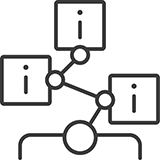The project identified eight key driving forces deemed to substantially influence the development of the two analysed types of platform work by 2030: technology, the labour market, consumer protection, labour regulation, sector regulation, information obligations relating to tax and social insurance authorities, platform ownership/governance, and platform business models. Based on assumed developments of these driving forces, 10 possible future scenarios were derived.
Technology
Technology develops at a moderate pace. 5G mobile technology is available only in the main cities, so that the Internet of Things (IoT) has developed only in these cities for predictive maintenance of buildings or large appliances or for tracking vehicles more systematically. Interconnectivity between technologies has improved but requires further development to arrive at a seamless connectivity and fully integrated solutions. Robotics, including artificial intelligence, develops for businesses. Households and private individuals tend to reject connected technologies to avoid companies’ intrusion into their privacy. Electric vehicles have reached a high level of market maturity, with widespread adoption of electric cars and bikes. Autonomous vehicles, in contrast, are still in a trial phase, with pilot projects in some areas, but they are not widely deployed.
Competencies and capacities to develop and implement algorithms, data storage and data analytics have developed and are widespread but have not yet reached their full potential in terms of both technological development and operational deployment in the economy and labour market. 3D printing has reached a substantial level of application in some manufacturing industries and some countries, driven in part by the need to reduce transport for environmental protection. The technology is not common in individual households. Virtual reality is often used for training purposes but not much elsewhere. Augmented reality and blockchain are still being tested, without wide deployment across sectors.
For platform work, a moderate pace of development results in a further concentration of its use in urban areas, while application in more rural areas remains limited. The limitations as regards interconnectivity, algorithms and data analytics hamper the appeal of platform-determined and worker-initiated platform work for business clients; hence, private individuals and households remain the main clientele.
On the demand side, no particular changes in dynamics occur as the services provided are neither strongly fostered nor hindered by the technological developments. For example, the need for maintenance services is unchanged as replacement parts are not yet 3D-printed by households themselves.
On the supply side, the advances in electric bikes and virtual reality facilitate platform work for a larger group of workers: electric bikes enable less physically fit people to engage in platform-determined work, and virtual reality enriches training in worker-initiated platform work.
Labour market
In the European economy and labour market, there is high degree of demand for high-skilled and low-skilled workers, with a hollowing out of moderately skilled jobs (polarisation). This is driven by the combination of megatrends: technological change, environmental developments, demographic changes and societal developments, and globalisation.
This stimulates more demand for workers for platform-determined work but also more supply, as moderately skilled workers opt for platform work due to a lack of alternatives. This development further enhances the power of platforms (and their clients), as the supply of labour exceeds demand, so workers are replaceable. The result is a further deterioration of the employment and working conditions of platform-determined workers and an increasing skills mismatch.
For the worker-initiated type, the resulting increase of platform work means people are more familiar with and accepting of this business model, which leads to more demand for platform-mediated household services at the expense of more traditional ways of making such arrangements. This improves the situation of workers who use platforms strategically to make a living or to earn additional income, while it decreases the earning opportunities of self-employed workers and companies (and accordingly, their employees) who rely exclusively on the traditional economy.
Consumer protection
In terms of consumer protection, there are different approaches across Member States to the application of the EU acquis and data protection. In some Member States, the competence of national consumer protection authorities has been expanded to cover platform-mediated peer-to-peer transactions. In others, platform-mediated transactions delivered by individuals not recognised as professional providers are not covered. In the latter case, consumers sometimes file complaints to the EU Court of Justice when a problem occurs in a platform-mediated transaction (mainly for worker-initiated platform work).
The enhanced security resulting from both the default expansion of consumer protection to platform work and court rulings positively influence clients’ willingness to use platform work. Accordingly, the development of platform work, notably the worker-initiated type, diverges across Member States, with more dynamic growth in those countries where consumers are protected. Due to the better market potential, (international) platforms are more likely to settle in those countries with stronger consumer protection. The position of workers in relation to the platforms further improves as there are more platforms to choose from.
Furthermore, as workers engaged in the worker-initiated type have the autonomy to set prices, they will charge clients higher rates to cover higher liability risks. If clients accept these rates, workers’ earnings are likely to increase. The insurance sector, in addition, will benefit from offering specific packages for platform workers (to cover their liability risks and possibly social protection).
In those countries with less consumer protection, consumer awareness of the risks related to services mediated through platforms increases due to the developments in countries with more protection. Accordingly, demand for platform-mediated services decreases, to the advantage of service provision in the traditional economy, where protection is better.
Labour regulation
There is no legal clarification on the employment status of platform workers in Member States or at EU level. This means that most EU platform workers are considered independent, self-employed workers or have a specific national employment status related to marginal or occasional work. If cases are brought before the courts, national courts decide on a case-by-case basis regarding platform workers’ classification as employee or self-employed. This results in different approaches across Member States and also within Member States across platforms and authorities (such as labour, tax and social protection authorities), as they might apply different criteria or interpret the criteria differently.
This situation has a strong potential for disadvantageous outcomes regarding employment rights and entitlements (including social protection and representation), particularly for platform-determined work. This type of platform work resembles more a hierarchical employment relationship than a market-based one, which would more likely justify employee status.
Sector regulation
Due to the particular characteristics of platforms, it is unclear which sector regulation should apply. Platforms argue that they are information society companies, while businesses in the traditional economy offering comparable services argue that platforms should be considered to belong to that specific sector (for example, transport or construction). It is left to the Member States to decide which sector regulations apply, and court cases on this issue emerge.
Unless it is clarified that platform-mediated services are subject to a specific sector regulation, platforms and their workers are not obliged to adhere to the requirements related to market access and business conduct in the traditional economy. This results in cheaper prices in the platform economy, fostering the demand for platform-mediated services at the expense of the traditional economy. This increases clients’ insecurity regarding service quality levels and liabilities, pushing up the importance of ratings. This, in turn, increases workers’ demand for transparency and objective criteria for ratings (to ensure fairness), redress options in case of perceived unfair treatment and the portability of ratings across platforms.
Information obligations regarding tax and social insurance
Similarly, it is left to Member States to decide whether platforms have to declare workers’ revenues for work performed through the platform or whether the worker is responsible for informing national tax and social security authorities. Accordingly, it highly likely that there is no common approach across Member States.
From the perspective of platforms, this is an incentive to operate in those Member States in which they are not obliged to follow any declaration or information-reporting procedures. From the workers’ perspective, those engaging in platform work as part of their overall professional activity (hence, worker-initiated rather than platform-determined work) are more aware of tax and social security regulations and procedures and are likely to report their platform work income as part of their overall income. Some of those conducting platform work as a side activity earn below the national declaration thresholds and hence are not subject to any reporting obligations. However, there will also be some platform workers who should declare their income but either are not aware of this obligation or consciously do not do so. This constitutes undeclared work, so state revenues from taxes and social protection are reduced.
Platform ownership and governance
The platform economy remains dominated by non-EU platforms that follow a shareholder-value model, whose aim is profit maximisation. This, in combination with the above-mentioned unclarified legal issues, will make it challenging to impose EU or national legislation on the platforms. These, furthermore, find creative approaches to circumvent regulations that reduce their shareholders’ profits – which tend to be spent outside of Europe.
Due to the strong position of the existing platforms and their networking effect binding workers and clients to them (‘lock-in effect’), and the above-mentioned economic and labour market situation, the existing non-EU platforms can further increase their market share in Europe. It will be difficult for new, indigenous platforms to successfully start-up and reach a competitive scale and scope. Such a situation is likely to further increase the market power of the existing platforms in relation to clients and especially workers. This challenges those engaged in platform-determined work due to their greater dependency on the platform.
Platform business model
Encouraged by these developments, the platform economy will expand further, and online labour platforms will diversify their fields of activity further. Platform-determined tasks expand beyond food delivery to the delivery of goods, including parcel and mail delivery; worker-initiated tasks are offered for additional types of household services, including care and personal services. The dynamically changing business models challenge the effectiveness of legislative regulations as these tend to take some time to be drafted and implemented, and hence might not ‘fit’ well as the platforms have developed further. Alternative regulatory approaches, such as collective agreements or soft law, might be required.
Consumers become more familiar with services mediated through platforms, resulting in increased acceptance and higher competition with similar services in the traditional economy.
Workers find more tasks on offer through platforms, hence increasing the potential to earn income through platform work; at the same time, jobs in the traditional economy might decrease due to the competition from platforms.










